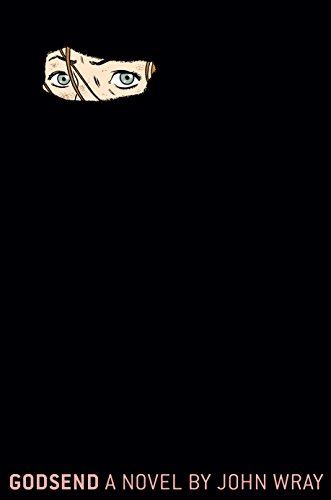John Wray’s fifth novel Godsend is both a culmination of his magpie approach to fiction writing and a complete departure from his work thus far. The premise—a young American woman joins the Taliban in the summer of 2001—is so straightforwardly narrated, with such unerring control, that Wray’s ambition and achievement only dawned on this reader in the days after finishing it. This is partly due to novelty. Godsend is the kind of go-for-broke political novel that’s rarely attempted and almost never succeeds. A writer would have a better chance of turning a eulogy into a wedding proposal than maintaining Wray’s high-wire act. Godsend supplants traditional elements of the political novel—a large cast of characters, thesis-driven monologuing, signposted symbolism—for an intimate approach: We’re positioned just over the shoulder of 18-year-old Aden Sawyer on her journey of inexorable destruction.
The novel opens in suburban California, where Sawyer is saying goodbye to her alcoholic mother and philandering father (who happens to teach Islamic Studies). She’s off to a madrasa near Karachi—toting her Pashtun boyfriend Decker, who oscillates between ambivalence and sarcasm—to study the Koran. In Pakistan she passes as a teenage boy by shaving her head and binding her breasts; she calls herself Suleyman. Soon she is recruited into the Taliban by the charismatic, reluctant Ziar (the madrasa elders repeatedly advise against this). As James Wood pointed out in The New Yorker, Aden’s coming-of-age narrative is intertwined with greater radicalization, a cruel hyperbole of the old “loss of innocence” trope: We know Sawyer will commit greater and more terrible acts of violence. We also know we can’t stop reading.
Wray has previously received a Whiting Award and a Guggenheim Fellowship, and was named one of Granta‘s Best Young American Novelists in 2007. I expect Godsend will bring a few more accolades to his CV. We conducted this interview over email as he traveled for his book tour.
The Millions: First things first: I understand the novel came out of a chance aside during interview research for a nonfiction piece on John Walker Lindh?
John Wray: That’s right. I was in Afghanistan on a journalist’s visa, looking for people who’d known Lindh during his time as a soldier in the Taliban’s infantry. At one point, in a small, half-destroyed village north of Kabul, we were delighted to find an old man who claimed to have known the boy soldier, Suleyman, which was Lindh called himself. Then, to my amazement, the old man mentioned, in passing, that he’d also known the girl. That’s how he put it: “the girl.” He couldn’t tell us her name, or much about her at all. That’s when this novel began.
TM: How did you come to Aden Sawyer’s voice? The novel places a heavy burden on her, which she wears lightly: She must be credible as an 18-year-old American, with knowledge of Islam, who is deeply rebellious but must operate within an order and religion which prizes submission (no pun intended).
JW: That’s always a slow and mysterious process, arriving at the voice of a book’s central character. In this case, it could be argued that Aden’s voice is the book’s voice—we’re always with her, always seeing the strange world she moves through with her eyes. I think I found the voice of the story—how it would sound, how it would feel, the somewhat stark, ominous mood it should have—and Aden’s voice came out of that.
 TM: I would say it’s a departure from your previous work, but every one of your novels is quite different from the others. The Lost Time Accidents was a 500-page, century-spanning novel on metaphysics written in a kind of comic high-European register. Godsend reminded me of a line from Philip Roth: After he wrote a long book, the next one was inevitably an act of rebellion. Was that true for you? I gather there may be more an element of chance to how you begin each project.
TM: I would say it’s a departure from your previous work, but every one of your novels is quite different from the others. The Lost Time Accidents was a 500-page, century-spanning novel on metaphysics written in a kind of comic high-European register. Godsend reminded me of a line from Philip Roth: After he wrote a long book, the next one was inevitably an act of rebellion. Was that true for you? I gather there may be more an element of chance to how you begin each project.
JW: I couldn’t agree more with that quotation from Roth. In my case, every new book is an act of rebellion against the last. It takes so damn long to write a novel—for me, anywhere from two to seven years—and I couldn’t imagine sitting down afterward and beginning something similar, either in tone or subject matter. I’d jump off the nearest bridge.
 TM: That’s a risky way to write though, isn’t it? No temptation to pen a Lowboy sequel? (Kidding. Kind of.)
TM: That’s a risky way to write though, isn’t it? No temptation to pen a Lowboy sequel? (Kidding. Kind of.)
JW: It is a risky way to write. But not as risky as jumping off a bridge!
TM: There’s also risk in tackling the subject. A cursory glance at the acclaimed books of the past few years shows an interest in autofictional inwardness (Sheila Heti, Karl Ove Knausgaard), historical settings (Colson Whitehead, Jennifer Egan), or multigenerational portraits (Jesmyn Ward, Min Jin Lee)—though in truth that last group is a perennial for writers. Terrorism and Muslim extremists are such third-rail subjects; did you approach the writing differently because of this? Related, are you nervous about being misread along these lines?
JW: You can’t court acclaim. The third rail has always been the one with juice in it, at least for me, at least so far. The best writing is the most urgent writing, I think. By which I mean the writing that matters most to the writer. I suppose that’s common knowledge, but it’s important to remind myself of it from time to time. Because of course the pressures to write acclaimed (not to mention marketable) books is considerable. And it only gets heavier with every book you publish.
As far as being misread—well, that’s another thing altogether. I did have that fear, and to some degree I still do. But it’s that fear that keeps me honest. It makes me work harder.
TM: The book’s surety and evenness of tone is a great strength here: It’s apparent on close inspection how much work went into its seeming effortlessness.
 Sawyer’s early line, “Not a girl, not a boy. Just a ghost in a body” signals her growing desire for self-effacement, which called to mind Knut Hamsun‘s Hunger. Were there texts in the Godsend constellation you read as research or saw as touchstones?
Sawyer’s early line, “Not a girl, not a boy. Just a ghost in a body” signals her growing desire for self-effacement, which called to mind Knut Hamsun‘s Hunger. Were there texts in the Godsend constellation you read as research or saw as touchstones?
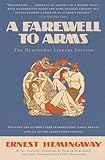
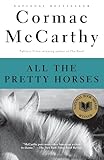
 JW: I read Hunger in my early 20s—luckily, or unluckily, before I’d found out what a Nazi its author was—and it impressed me, though I can’t remember why. It wasn’t a touchstone for Godsend, though of course many other books were. A Farewell to Arms comes to mind, and Shirley Hazzard‘s novels, and All the Pretty Horses, and The Goalie’s Anxiety at the Penalty Kick by Peter Handke. I’m not exactly sure why those are the books that I’m mentioning—others were maybe more important. But there you go. My memory is terrible.
JW: I read Hunger in my early 20s—luckily, or unluckily, before I’d found out what a Nazi its author was—and it impressed me, though I can’t remember why. It wasn’t a touchstone for Godsend, though of course many other books were. A Farewell to Arms comes to mind, and Shirley Hazzard‘s novels, and All the Pretty Horses, and The Goalie’s Anxiety at the Penalty Kick by Peter Handke. I’m not exactly sure why those are the books that I’m mentioning—others were maybe more important. But there you go. My memory is terrible.
TM: I’ve heard you enthuse for Shirley Hazzard before, and lament she’s not better known or read widely. I haven’t read her work yet—tell me what I’ve been missing.
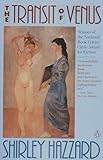 JW: Finally an easy question to answer! Shirley Hazzard is one of the masters. No one writing now has her eloquence, it often seems to me, or her intelligence, or her judgment. In an era in which the writer’s identity and persona are the industry’s main marketing tools, it’s no wonder that she isn’t better known—she had no interest in inserting herself between her readers and her books. The idea of letting one’s work stand for itself seems almost quaint these days, and Shirley’s “profile” no doubt suffered as a result; the fact she often took a decade, or more, to write her deceptively slender novels most likely didn’t help, either. But The Transit of Venus is one of the great novels in English of the 20th century.
JW: Finally an easy question to answer! Shirley Hazzard is one of the masters. No one writing now has her eloquence, it often seems to me, or her intelligence, or her judgment. In an era in which the writer’s identity and persona are the industry’s main marketing tools, it’s no wonder that she isn’t better known—she had no interest in inserting herself between her readers and her books. The idea of letting one’s work stand for itself seems almost quaint these days, and Shirley’s “profile” no doubt suffered as a result; the fact she often took a decade, or more, to write her deceptively slender novels most likely didn’t help, either. But The Transit of Venus is one of the great novels in English of the 20th century.
TM: This is your fifth novel. Taking a step back: Are there ideas or concerns you see across your work?
JW: It’s so hard to take stock of one’s own work in this way—it’s like trying to study the back of your head without a mirror. A perceptive reader told me recently that my books tend to feature protagonists who carry belief to extremes—political radicals, religious fanatics, the mentally ill, lovers in way, way over their heads. I’m not sure if that’s accurate, but I do like the sound of it.
TM: It sounds accurate to me. There are often protagonists of great conviction, and of course a strong narrative voice.
In terms of structure, Godsend has an accumulating momentum, a kind of awful, inexorable feeling of doom (in a good way). It’s so rare to read something for 230 pages without a moment of friction. How does that come about for you? Are you drafting with an outline in mind? Or rearranging and cutting in the revision stages? Or—and I would believe this—is the muse just dictating into your ear while you exclaim, “Yes, yes! Bingo!”
JW: I never use an outline, strange to say. Outlines feel too much like school. I’ve always operated under the assumption, rightly or wrongly, that if I’m excited by what I’m working on, the reader will be too. An advance plan would certainly speed things up a bit. But whoever claimed that the easiest books to write are the most gratifying books to read? Not this cowboy.
TM: The New York article about your place in Park Slope looks like a midwestern undergraduate’s fantasy of life as a Brooklyn writer. Do you debate autofiction while playing ping pong? Read Proust to each other over corn flakes? And more seriously, how’s NYC for novelists these days? Gary Shteyngart said in an interview all his friends have left for Berlin or the Hudson Valley.
JW: Life for novelists—or for any kind of artist—in New York these days is bitter. I had the great good luck to have been tipped off to something affordable almost 18 years ago, an apartment with low maintenance the down payment of which I could afford with my very first advance, and to have been pushed into taking that terrifying leap by someone who had a clearer sense of what the future held. It was dumb luck, basically. So it’s given me real pleasure, possibly the greatest satisfaction of my adult life, to be able to open up the place I now live in to people doing good work. What the fuck is this city going to be without its artists? The prospect makes me sick.
TM: Your books operate within sets of constraints, as if each was a challenge you’d set yourself (apart from the natural challenges of writing novels). What does your cutting room floor look like? Are there half-completed projects? Abandoned epics set in the German countryside?
JW: I actually cut very little from my manuscripts. That fact surprises me as much as anybody. I’m a firm believer in the dangers of regarding one’s own writing, especially at the early stages, as some kind of precious and finite commodity; so I’m very willing, and even excited, to trim the fat whenever I can—but writing is also like pulling teeth to me, so I tend not to over-write. I’m not as loose as some—I’d like to be, but I’m not. I guess you might say I value economy. I don’t like to waste stuff.
TM: Reviews have noted Godsend‘s straightforward, nuanced treatment of religious belief (another third rail in contemporary fiction). I wonder if you could speak to how you approached it, and your thoughts on religious belief in novels in general.
JW: I’d say that some kind of passionate belief is crucial to the central character of any novel—without a degree of fanaticism, or at the very least fiercely held and defended points of view, it’s hard to generate enough conflict for a book, or even a conversation, to be genuinely suspenseful. I’m not a religious person myself, in any conventional sense, so diving head-first into the intricacies of fundamentalist Islam was pretty daunting. But Aden, my protagonist, arrives in Afghanistan knowing next to nothing about the life she’s chosen. Her ignorance helped me to feel more at peace with mine.
TM: Last question! Forgive me for beating a dead horse, but it should be noted how unique this novel is in the current landscape, at least with respect to a gigantic leap of empathy and artistic imagination across gender, faith, geography, etc. What’s your impression of books being published these days? Do you wish more writers would take leaps like this? I swear I’m not trying to set you up for a clickbait response—I’m curious about your read of the scene and if you had advice for emerging writers…
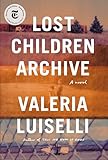
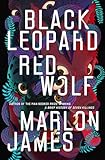 JW: There are always worthwhile novels being published, if you search hard enough. I’m looking forward to Valeria Luiselli‘s Lost Children Archive at the moment, and to Marlon James‘s experiment in speculative fiction, Black Leopard, Red Wolf. The appeal of fiction—both for the writer and for the reader, it seems to me—lies in escaping one’s socially-dictated point of view. Fiction is about looking out at the world through someone else’s eyeballs. It’s about getting strange, in every available sense of that word. That’s how a novel should feel: It should make you, however fleetingly, a stranger to yourself. Everything else is just memoir with fictional frosting. I’ve had quite enough of that.
JW: There are always worthwhile novels being published, if you search hard enough. I’m looking forward to Valeria Luiselli‘s Lost Children Archive at the moment, and to Marlon James‘s experiment in speculative fiction, Black Leopard, Red Wolf. The appeal of fiction—both for the writer and for the reader, it seems to me—lies in escaping one’s socially-dictated point of view. Fiction is about looking out at the world through someone else’s eyeballs. It’s about getting strange, in every available sense of that word. That’s how a novel should feel: It should make you, however fleetingly, a stranger to yourself. Everything else is just memoir with fictional frosting. I’ve had quite enough of that.
